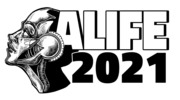 | ALIFE 2021: The Conference on Artificial Life VIRTUAL UCT Prague, Czechia, July 19-23, 2021 |
| Conference website | http://2021.alife.org |
| Submission link | https://easychair.org/conferences/?conf=alife2021 |
| Submission deadline | March 14, 2021 |
ALIFE 2021 will be a virtual conference on artificial life.
ALIFE 2021 will showcase a wide range of topics in Artificial Life, bringing together world-leading researchers to discuss the latest advances in the synthesis and simulation of living systems. Topics of interest include, but are not limited to, the following aspects of Artificial Life:
-
Complex dynamical systems and networks
-
Artificial chemistry, origins of life, computational biology
-
Synthetic biology, protocells and wet artificial life
-
Ecology and evolution
-
Bio-inspired, cognitive and evolutionary robotics, swarms
-
Artificial intelligence and machine learning
-
Perception, cognition, behavior
-
Social systems, artificial and alternative societies
-
Evolution of language, computational linguistics
-
Philosophy of mind, philosophy of science
-
Artificial-life-based art
-
Artificial Life in education
For this edition of the conference the special theme is "Robots: The century past and the century ahead".
Submission Guidelines
There are two options for submission: either full paper or extended abstract. Note that the format is exactly the same for both options. The difference resides in the number of pages and type of contents:
-
Full papers have an 8-page maximum length and should report on new, unpublished work.
-
Extended abstracts are limited to a 2-page length and can report on previously published work.
Please see the author guidelines below for detailed instructions and manuscript templates. All submissions will undergo a detailed peer review process. Full papers will be reviewed for timeliness, novelty, scientific quality, sound methodology and use of appropriate analysis techniques. Abstracts will be reviewed for timeliness, novelty, and quality. Both papers and extended abstracts will be considered for oral or poster presentation, without distinction between full papers and extended abstracts. Accepted papers and extended abstracts will be published by MIT Press as open-access electronic proceedings.
We encourage the use of LaTeX for the production of papers. LaTeX and Microsoft Word templates are available here.
Note that for both submission types you will need a text-only abstract (200 words or less), which will be displayed in the programme and on the web after publication. Note that in addition to the pdf you will need a text abstract when you upload your submission (500 words max, shorter preferred).
The reviewing process is single-blind, meaning that submissions do not have to be edited to remove authors' names.
The following formatting instructions apply to the final version of your manuscript, if it is accepted for publication:
-
One single PDF, no additional file.
-
PDF length <= 8 pages for full papers, <= 2 pages for extended abstracts. (The page length maximum is only for the body of the paper and does not include citations).
-
PDF size < 5 Mb.
-
All pages sized consistently at 8.5 x 11 (US letter format).
-
No visible crop marks.
-
Color figures are possible. Images at *no greater* than 300 dpi, scaled at 100%.
-
Embedded open type fonts only.
-
All layers flattened.
-
All desired links active in the files: This can be done easily with LaTeX. To automatically turn all your internal references (citations, figures, equations, sections...) into internal hyperlinks in the PDF, add \usepackage{hyperref} in the preamble of your .tex file. If you get an error ("Paragraph ended before \Hy@setref@link was complete") upon compilation, remove the .aux files and try to compile again, this should fix the problem. To insert links pointing outside the document, use \url{http://theurlyouwanttoinsert}. It will show the URL using a mono-spaced font and, if readers click on it in the PDF, their browser will be opened pointing at it.
Special Sessions
- ALife and society
- Artificial Perception: Machines with Lifelike Failings
- Bio-inspired approaches for modular robotics
- Complexity ALI[F|V]E: Socializing & Eco-integrating robots with living organisms
- Hybrid life IV: Approaches to integrate biological, artificial and cognitive systems
- Illusions of Self: Beyond Human, Animal, and Robot
- Synthetic Approaches to Biology and Artificial Intelligence: from R.U.R. to contemporary Artificial Life research
Committees
Program Committee
- Silvia Holler (chair)
- Martyn Amos
- Manuel Baltieri
- Julyan Cartwright
- Harold Fellermann
- Takashi Ikegami
- Jean-Baptiste Mouret
- Stefano Nichele
- Charles Ofria
- Alexandra Penn
- Donato Romano
- Hiroki Sayama
- Thomas Schmickl
- Lana Sinapayen
- Pasquale Stano
- Susan Stepney
- Olaf Witkowski
Organizing committee
- Jitka Cejkova (chair)
- Tomas Mikolov
- Will Millership
Contact
All questions about submissions should be emailed to 2021alife@gmail.com
